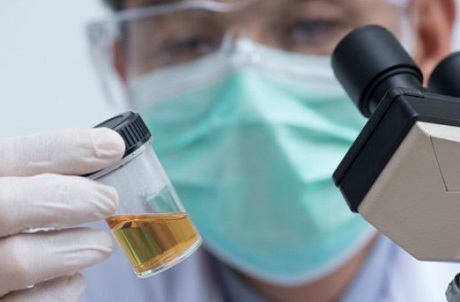Nikhil Prasad Fact checked by:Thailand Medical News Team Jun 13, 2024 1 year, 8 months, 1 week, 4 days, 15 hours, 14 minutes ago
Medical News: Lung cancer is the leading cause of cancer deaths in the United States. This is largely because many patients are diagnosed at a late stage when the disease is more challenging to treat. The survival rate over five years is only between 18% and 21%, emphasizing the importance of early detection for better prognosis. Recent advancements in medical research have identified potential biomarkers in urine that could help in the early diagnosis of lung cancer.
 New Urine Test for Early Lung Cancer Detection Shows Promise
Discovering a New Urinary Biomarker
New Urine Test for Early Lung Cancer Detection Shows Promise
Discovering a New Urinary Biomarker
A groundbreaking study by scientists from the U.S. NIH, Maryland-USA that is covered in this
Medical News report has identified four potential biomarkers in human urine that can aid in diagnosing lung cancer. Among these, one notable biomarker, referred to as "561+," stood out due to its unique properties. Researchers discovered that this biomarker could be a fragment of a larger molecule, 27-nor-5β-cholestane-3α,7α,12α,24,25 pentol glucuronide. This molecule had not been previously identified in human urine in connection with lung cancer.
Understanding Biomarkers
Biomarkers are biological molecules found in blood, other body fluids, or tissues, indicating a normal or abnormal process, or a condition or disease. In this study, the focus was on identifying metabolites in urine that could signal the presence of lung cancer. By isolating and studying these biomarkers, scientists hope to develop non-invasive tests that can detect cancer early, improving patient outcomes.
The Science Behind "561+"
Using advanced techniques like mass spectrometry and nuclear magnetic resonance (NMR), researchers isolated and identified the structure of "561+." The molecule was found to have a specific configuration, known as 27-nor-5β-cholestane-3α,7α,12α,24R,25S pentol glucuronide. This detailed identification process involved synthesizing various possible structures and comparing them with the molecule found in urine samples from lung cancer patients.
Importance of Stereochemistry
Stereochemistry, the study of the spatial arrangement of atoms in molecules, played a crucial role in this research. The specific arrangement of atoms in the biomarker "561+" was determined to be 24R,25S, which is different from previously reported configurations. This precise identification is essential for accurately detecting and quantifying the biomarker in urine samples.
Developing a Synthetic Standard
To confirm the identity of "561+," researchers synthesized the molecule in the lab. This involved creating a series of chemical reactions to build the molecule from simpler components. The synthetic version of 27-nor-5β-cholestane-3α,7α,12α,24R,25S pentol glucuronide was then compared with the natural biomarker found
in urine, confirming their match. This synthetic standard is vital for developing reliable diagnostic tests.
Potential for Early Lung Cancer Detection
The identification of "561+" as a potential biomarker for lung cancer is a significant step forward in early cancer detection. By developing a urine test that can detect this biomarker, doctors could diagnose lung cancer at an earlier stage when it is more treatable. This non-invasive test could become a routine part of medical check-ups, leading to earlier intervention and better patient outcomes.
Next Steps in Research
While the discovery of "561+" is promising, further research is needed to validate its effectiveness as a diagnostic tool. Large-scale clinical trials will be necessary to determine the accuracy and reliability of detecting this biomarker in diverse populations. Additionally, researchers are exploring other potential biomarkers identified in the study to create a comprehensive panel for lung cancer diagnosis.
Conclusion
The identification of a new urinary biomarker, 27-nor-5β-cholestane-3α,7α,12α,24R,25S pentol glucuronide, marks a promising advancement in the fight against lung cancer. This discovery highlights the potential of non-invasive urine tests for early cancer detection, offering hope for improved survival rates and better quality of life for patients. As research continues, the dream of routine early detection for lung cancer moves closer to reality, promising a brighter future for those at risk.
The study findings were published in the peer reviewed journal: Molecules.
https://www.mdpi.com/1420-3049/29/12/2781
For the more about the latest diagnostics, keep on logging to Thailand
Medical News.
Read Also:
https://www.thailandmedical.news/news/university-of-michigan-develops-new-urine-test-that-detects-high-grade-prostate-cancer-as-an-alternative-to-biopsies
https://www.thailandmedical.news/news/new-simple-urine-tests-to-detect-cervical-pre-cancer
